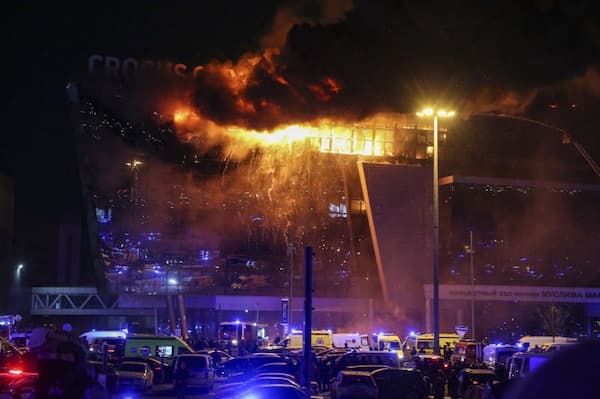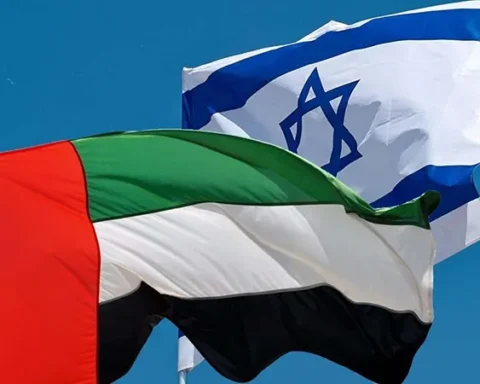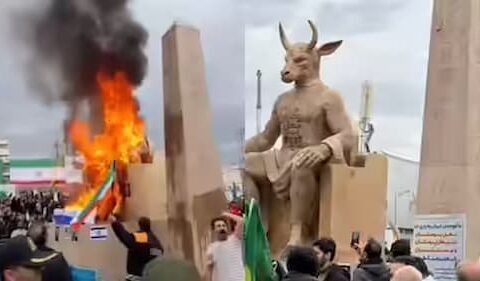The brutal terrorist attack near Moscow on Friday, which has killed upward of some 140 people, seems to have taken Russian authorities by surprise.
In Western media, blame was quickly attributed to the Islamic State group, specifically ‘ISIS K‘ or ‘ISIS Khorosan‘ – a group operating in Central Asia, primarily Afghanistan, where it has been at war with the Taliban.
But has this attribution of blame been too quick?
Russian investigators hadn’t even interrogated any of the gunmen yet when the foreign media had already firmly declared ISIS K to be responsible.
Moreover, the Russians themselves are saying it was not an Islamist attack – the Kremlin is saying the attackers came from within Ukraine. Putin says the 11 captured attackers were trying to cross into Ukraine: he didn’t mention ‘ISIS’ at all in his address.
The editor-in-chief of Sputnik’s parent media group said that the names and faces of the perpetrators were already known to authorities. “It immediately became obvious why US media were claiming in unison that it was ISIS,” she said. “It has nothing to do with ISIS. It’s Ukrainians.”
We have two contradictory narratives here regarding the same event.
So what’s actually happening here?
Well, obviously it’s hard to be sure, especially this early.
But let’s look at some things. And let’s do so unbiasedly and without drawing conclusions.
Firstly, it’s worth noting that ‘ISIS K’ has *not* claimed responsibility, despite some media claims to the contrary. It was the central Islamic State group that had apparently claimed responsibility – while the specific Khorosan group has said nothing.
Obviously, official claims of responsibility sometimes need to be taken with a pinch of salt. And, given historic ties between ‘ISIS’ operations and foreign intelligence agencies, these things are often more nebulous than the surface account show.
That being said, it is now reported that ISIS has released video footage of the attack, which they say is from one of their gunmen who carried out the atrocity. ‘The video surfaced on a Telegram account believed to be associated with Amaq, the news outlet linked to IS, as per the SITE monitoring group.’
Let’s note, however, that the SITE Intelligence Group, as I’ve covered before, is an Israeli linked for-profit organisation that has been heavily implicated in the Islamic State Psy Ops from 2014 onward. For one example, in September 2014, it somehow sent the video of Steven Sotloff’s ISIS beheading to its subscribers *before* the jihadists had even released the video.
There’s also the much publicised fact that American agencies apparently warned about an imminent terror attack in Russia.
The publicised warning specifically told people to avoid large gatherings in Moscow.
Some media is suggesting that this warning was specifically issued to the Kremlin and that Putin ignored it: reminiscent perhaps of the Egyptian warnings to Israel before October 7th.
If this is true, then the Kremlin’s motives need to be questioned.
However, other accounts are that it wasn’t a government to government or agency to agency warning – but rather the US was warning Americans and foreigners in general to get out of Moscow.
This latter idea is a little confusing, as I wouldn’t have thought there were many Americans still in Moscow at this point in time. But I could be completely wrong about that.
There seems to be some ambiguity over whether Moscow was directly warned by the Americans or whether it was just a general warning put out by the US about a likely or imminent terror incident.
The BBC, for example, suggests it was a direct warning to the Kremlin. Putin has suggested, however, that there were no specific details – and presented the whole thing as a ‘destabilisation’ operation.
It does raise the question of how the Americans knew in advance, whereas Russian intelligence apparently did not.
Is the implication that Moscow allowed this attack to unfold for some reason?
State-enabled terror attacks are always the best way to justify tightened security and crackdowns at home and/or retaliatory action abroad. October 7th is a prime example of that.
As far as the US side of things is concerned, it is normal for intelligence agencies to share intel with foreign governments in some instances – even with governments that have a strained or hostile relationship.
And the fact that Putin apparently does acknowledge that *something* was communicated suggests that the US probably did warn Moscow.
Which does start to suggest Moscow might’ve allowed the attack to unfold.
An obvious explanation for why Moscow would downplay the ISIS element would be because it suits them better to blame Ukraine at this point – providing renewed justification or momentum for military operations across the border.
This is assuming that ISIS was behind the attack.
If the Kremlin is right and the attack originated from inside Ukraine, then things are more complicated.
If this was the case, why would Western agencies unanimously blame the Islamic State? To protect Ukraine from retaliatory action? Would that even work – or would Russia do whatever it wanted anyway?
And wouldn’t a Ukrainian-origin attack on Moscow be a propaganda win for the Ukrainian war effort?
Maybe not: the nature of the attack and the ruthless gunning down of civilians probably wouldn’t do them any favours in the image department.
It’s also possible that both claims are partly true: that ISIS was involved in the attack, but that it was also planned from within Ukraine.
That gets very confusing.
But all kinds of factions, including Islamist fighters, have been utilised in this Russia/Ukraine conflict – though the Islamist fighters have been mostly used by the Russian side, Chechens in particular. But this has even allegedly included Islamic State fighters.
There are also all kinds of special forces and intelligence operatives involved on the ground in Ukraine: including Israeli special forces, British special forces, and various Western covert forces, etc.
Meaning that all kinds of covert ops, psy-ops, intelligence and counter-intelligence operations have probably been going on.
In turn, meaning that, if this was any kind of false flag or smoke-and-mirrors, it could’ve involved almost anyone at its root.
The timing is also interesting, as this attack comes right after Putin’s ‘landslide victory’ (as in, foregone conclusion) in the Russian elections, but also after the growing reports, just days ago, of anti-Putin armed groups advancing to Russia from within the Ukrainian conflict zone.
As France24 conveyed, ‘Ukraine-based Russian militias are again on the attack, staging cross-border raids this week into Russian territory. Pro-Ukrainian forces even claimed on Tuesday, March 12, to have taken full control of a Russian village…’
A destabilisation operation in Russia, as claimed by Putin, would make some sense at a time like this.
On the other hand, the much simpler narrative of an ISIS-linked attack is perfectly plausible.
There have been threats made against Russia for some time now from jihadist entities. Indeed, one of the reasons stated by Putin for the Russian intervention in Syria was the fear of jihadist groups expanding and linking up not just in the Middle East but in Central Asia and Russia.
In terms of whether Russia either orchestrated the attack as a false flag operation or – more likely – simply allowed an attack to unfold (even after an American warning), a lot depends on what the Kremlin does in response.
If Putin uses this to justify a ramping up in Ukraine or some kind of excessive retaliatory action, then maybe we’ll be looking back at this as Russia’s October 7th moment – a horror that was allowed to happen so that it could be used as a catalyst for something else.
That would explain why Russian intelligence might’ve ignored the warning, and why Putin is insisting it was Ukraine behind the massacre and not ISIS.
In fact, there might be precedent in Russia for this sort of scenario.
It could be noted that this attack in the concert hall bears some resemblance to the infamous Moscow theater siege in 2002, carried out by Islamic fighters from Chechnya.

The thing about that event – which resulted in the deaths of many Russians – is that more and more evidence gradually emerged to suggest that the FSB might’ve stage-managed the entire ‘terrorist attack’ themselves, albeit utilising Chechen fighters.
According to an independent investigation of the event, the FSB knew about the terrorist group’s arrival in Moscow and directed them to the theater through their agent provocateur Khanpasha Terkibayev, who was among the hostage takers but who left the theater alive.
In 2003, former FSB officer Alexsander Litvinenko said in an interview with Australian Dateline that two of the Chechen militants involved in the siege were working for the FSB, and that the agency manipulated the terrorists into staging the attack.
In the aftermath of the siege, Putin and the Kremlin expanded its attacks in Chechnya, targeting Chechen Separatists. It also used the crisis to really begin its crackdown on independent media in Russia and vastly expand anti terror legislation.
Which is not to say that this latest attack was a false flag or a stage managed event. Just that there’s precedent.
As ever, when everyone lies all the time and is engaged in propaganda and counter-propaganda – both on the Russian side and on the Western side – it becomes virtually impossible to figure out the definitive truth.
Not to mention that both the Russians and the West have a history of false flag operations.
There are no honest actors in this theatre. No trustworthy sources.
Whatever the truth, the attack itself appears to have been horrific.





Thanks for this. I think this is a very respectable first look at the event but definitely deserves a follow up as in the intervening time it has emerged that the event was staged by the Russian government.
https://edwardslavsquat.substack.com/p/a-very-curious-crocus-video?utm
Brilliant, James. That’s that then. Thanks, I had not seen this at all. Classic false flag.
Good level-headed analysis as always, Saj. I’m not sure how you even begin to separate the wheat from the chaff on this occasion but my own feeling (and I should emphasise that I have no evidence to back this assertion at all) is that the sheer timing of the attack suits the Kremlin and Putin and is far more advantageous to the Russians than to either Ukraine or the West. Had it happened during the immediate run up to the elections, of course, the situation would have been quite different, but Putin is now back in an extremely strong position. And it is likely that he will soon reveal how the culprits to one of the most heinous terrorist atrocities (it truly was horrific) were sent by Ukraine. A clear cause to double down on the war effort and commence an escalation already in the pipeline that is now amply justified.
However, there is one contrary fact that does cause me to wonder whether the West and its Ukraine proxy didn’t have some involvement. Simply the rapidity of their own bizarre denials. Ukraine didn’t do it, they repeated in unison, very reminiscent of little children caught in the act! It would surely have made better sense to send condolences and STFU about likely perpetrators. Unless perhaps they were trying to get ahead of the false flag narrative. But even that would imply they had foreknowledge. Or how else get the whole ISIS-K story out so fast?
Doubtless many more facts will come to light in the coming days and weeks. And I’ll definitely be back soon to review your subsequent thoughts because you’re reliably ahead of most other analysts when events of this kind occur. Nice work getting this piece out so promptly too.
Thanks very much, wallofcontroversy. I think I’m with your take, really. Tentatively, anyway. It’s a very tricky one though. I know I should cover this subject again. I’m waiting for better information still.